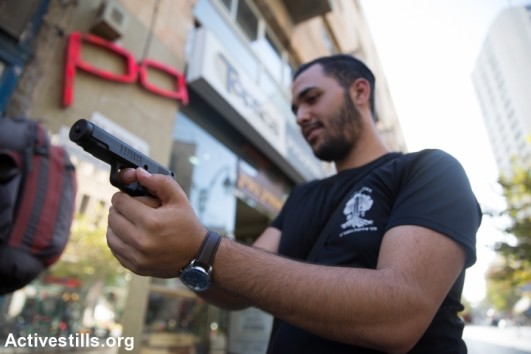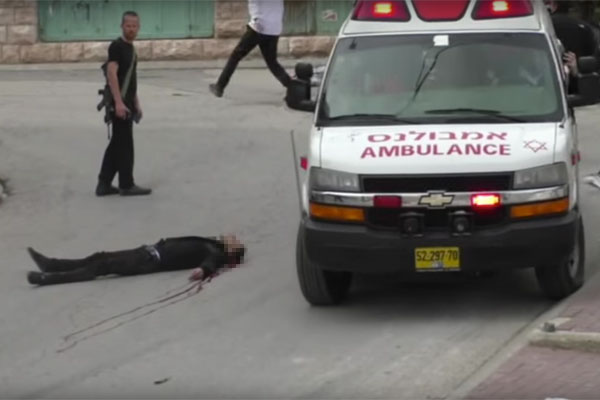When Israeli leaders keep pushing the message that killing Palestinian attackers is a laudable act, is it any wonder that the shooters become our national heroes?
WARNING: This post contains a highly graphic video and images.
The actions of an Israeli soldier who executed a wounded Palestinian attacker in Hebron on Thursday have been condemned by politicians from right to left, including Prime Minister Benjamin Netanyahu and Defense Minister Moshe Ya’alon — albeit indirectly — as well as by the Israeli media. Everyone is at pains to stress how far the soldier strayed from the IDF’s values when he shot Abed al Fatah a-Sharif in the head as he lay injured in the street, having already been shot after reportedly attacking a different soldier.
The military itself sprang into action, arresting the soldier in question and opening an investigation against him on suspicion of murder.
But the shock itself is jarring. Since the current wave of increased violence began — set off, arguably, by an Israeli soldier killing Hadeel al-Hashlamon in almost exactly the same spot, almost exactly six months ago — Israel’s ruling coalition has done next to nothing to try and calm down a public that is apparently in favor of extrajudicial killings and has at the same time developed a serious snuff film habit.
The biggest uproar over the issue of Israelis shooting dead Palestinian assailants in recent months was actually caused by IDF Chief of Staff Gadi Eizenkot, who said that he didn’t want to see “a soldier empty a magazine on a girl with scissors.” Eizenkot was swiftly criticized by numerous members of the ruling coalition.
By comparison, when (“centrist”) politicians in government or spiritual leaders have expressed the need to shoot to kill every Palestinian assailant there has been precious little notice taken, while vigilantism is at best half-heartedly advised against and at worst actively encouraged.
The Israeli press bears huge responsibility for this state of affairs as well, using chauvinistic, dehumanizing and vulgar terminology when describing Israeli responses to Palestinian assailants, would-be or actual (and occasionally when no attack has been planned at all).

Words like “eliminated” and “neutralized” are de rigueur when referring to a Palestinian assailant who has been shot by Israeli security forces, and the shot individuals themselves are only ever labeled terrorists, whether they actually managed to carry out an attack or not. In certain cases, you may even see a photograph of a dead Palestinian with the word “eliminated” stamped over it in red.
The soldiers and police officers who pulled the trigger, meanwhile, are lionized in news stories, with detailed descriptions of exactly how and when they opened fire accompanied by glowing commendations from their superiors and peers. They may even be bestowed with an honorific, as was the “Terminator,” a member of an elite IDF unit who shot dead three alleged Palestinian assailants in the space of nine days. His photo and “accomplishments” went viral after being published by the Israeli army.
In October last year, during the opening few weeks of this latest wave of violence, Israel Hayom — a foreign-funded freesheet and the most widely-read paper in the country — published two sets of photographs on its front page. On top was a row of pictures of Palestinians running with knives; underneath, pictures of Israelis running with firearms and aiming their guns at the assailants. The accompanying headline was “Their hatred, and our heroism.”
The message that comes through time and again is that shooting dead Palestinian attackers is a laudable act, and one that may well turn whoever fired the gun into the latest national hero.

So why is everyone so shocked? Where were the government voices in the last six months to suggest that, perhaps, killing Palestinians who either carried out or threatened to carry out an attack is not an act of national heroism? Where has been the discussion — save for in a few sparse and reviled corners — of the consistent use of lethal force by the army and police and the almost blanket immunity they enjoy? How often have members of the ruling coalition deviated from the standard line that these kids with guns are heroes, and even more so when they pull the trigger?
The soldier who executed Abed al Fatah a-Sharif on Thursday is rightly being brought before the law. But the far broader and more pressing issue is that he was simply following the example that dozens before him have set, and have been praised for.
As usual when these incidents are caught on camera, however, the “gone rogue” narrative looks likely to prevail, and that is a gift to Israel’s political echelon. That way there’s no systemic issue to grapple with, and everyone can pretend that a portrait of an execution is just an unpleasant reel of film, and not a mirror.


